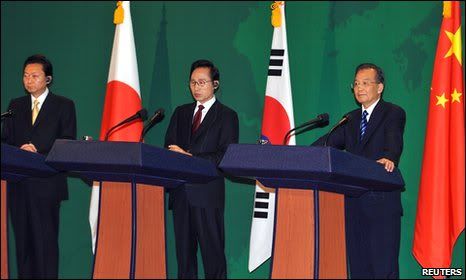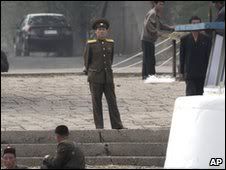
Mr Wen (right) wants to avoid Korean instability at all costs

A war would see a flood of refugees over the North Korea-China border
At the end of the three-way conference between President Lee Myung-bak of South Korea, Yukio Hatoyama, the Japanese prime minister, and Wen Jiabao, the Chinese premier, a great many people here must have been hoping to hear Mr Wen criticise North Korea for allegedly torpedoing the South Korean naval ship Cheonan two months ago.
At the very least they would have wanted him to accept publicly that North Korea had been responsible for it, as an international inquiry has maintained. If so, it was one of the most dangerous acts of war in the Korean peninsula in recent years.
Mr Wen refused. He sent his condolences to the families of the 46 South Korean sailors who were killed. He called for restraint. He hinted at the dire consequences of war.
But even though North Korea is China's protege, he would not condemn it in public.
Not good company
Nowadays China is keen to show the world that it is serious and responsible - a great power which can be trusted to behave properly.
And yet it chooses to give its support to a country which is regularly accused of being an outlaw.
If you see things from the vantage point of Beijing, though, it all looks rather different.
It seems safe to assume that if the Chinese felt they could safely dump North Korea and its strange, eccentric leader Kim Jong-il (whom his people are expected to call The Dear Leader), they certainly would.
Each new group of leaders in China, as it comes to power, is a little less friendly and supportive towards him. The Dear Leader is nothing short of an embarrassment. His regime is regularly accused of planning crimes and assassinations.
It is hard to work out whatever reason one of his submarines would have had to attack a South Korean ship in South Korean waters. Yet most experts here and in the West assume that the orders must have come from the top - or very near it.
This is not good company for China to keep.
Suppose, though, that Wen Jiabao had emerged from his summit meeting and told the world's press that China condemned North Korea in strong terms. His government would have made several new friends; but Kim Jong-il would have gone off the deep end immediately.
War, which despite the rhetoric actually seems quite far away at present, would have become more likely right away. Without China to warn him of the consequences, he or his associates could easily order an attack on South Korea.
Even so, outright fighting, though it might cost a great many casualties, would almost certainly be won by the South, with American help.
Large numbers of refugees would flood across North Korea's border with China. Kim Jong-il's ramshackle regime would probably fall quickly. Korea would be reunited, as a capitalist, strongly pro-American ally abutting on to China.
Who knows what might happen then to China's own, often insecure political leadership?
Mr Wen and his colleagues could lose everything.
This is all highly speculative; but we can be sure that China believes instability on the Korean peninsula is something which has to be avoided at all costs - just in case.
And if that means angering the South Koreans and turning a blind eye to a shocking act of aggression, so be it.
The way China sees it, this will protect the safety of ordinary South Koreans better than any ritual condemnation.
All the same, many other countries will regard it as yet another example of the tail wagging the dog: the uncontrollable North Koreans forcing their immensely more powerful Chinese neighbours to support them - or else.






0 comments:
Post a Comment